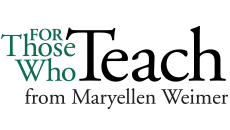When an exam approaches, virtually all students agree they need to study and most will, albeit with varying intensity. Most will study the same way they always have—using the strategies they think work. The question students won’t ask is: How should I study for this exam? They don’t recognize that what they need to learn can and should be studied in different ways.
 When they get a good grade on an exam, students regularly attribute the success to luck. How likely are they to tell each other they studied hard and then share the specific strategies that resulted in a high mark? And if the grade isn’t that good? You’ll hear excuses more often than personal accountability. “The questions were tricky.” “The stuff I studied wasn’t on the exam.” “I had three other tests this week.” “I never do well on essay exams.”
When they get a good grade on an exam, students regularly attribute the success to luck. How likely are they to tell each other they studied hard and then share the specific strategies that resulted in a high mark? And if the grade isn’t that good? You’ll hear excuses more often than personal accountability. “The questions were tricky.” “The stuff I studied wasn’t on the exam.” “I had three other tests this week.” “I never do well on essay exams.”
Students’ success as learners would advance if they had a larger repertoire of study strategies, if they could match study strategies with learning tasks, and if they constructively confronted how they studied with how they performed. Students need help on all three fronts, but courses are already packed with content. Most teachers have time to do little more than admonish students to study hard, avoid cramming and memorizing minutia, and abstain from any sort of cheating.
Here’s another option—a survey instrument with 19 questions developed by researchers Amanda Sebesta and Elena Bray Speth at Saint Louis University. The two were interested in what self-regulated learning strategies students used most when studying for exams in a large introductory biology course, which of those strategies were associated with higher exam grades, and what strategies students proposed using to prepare for the next exam. Highlights of what they found appear in the October issue of The Teaching Professor. You can find their survey questions in the downloadable Word doc at the end of this article.
This set of questions grew out of the seminal work on self-regulated learning (SRL) by Zimmerman and Martinez-Pons, who define SRL as the “response to metacognitive awareness of a gap between performance and goals (…). Driven by self-efficacy and the will to improve, the learner implements intentional changes in learning strategies.” The questions ask students about their use of evidence-based study strategies like goal setting and planning, seeking information, keeping records (taking notes, environmental structuring (finding a quiet place to study) and the consequences of their study decisions, among others.
The best time to use questions like these is when the exam is returned. Will students seriously consider and respond to the questions? Some will, and perhaps more will take it seriously if they must submit their answers before their exam grade is recorded. More important than their written responses is the effectiveness of questions like these to motivate the use of more and better study strategies. That might be enhanced by tallying the study strategies used by high-scoring students and sharing them with students. Findings from the study might be persuasive as well. For example, Sebesta and Bray Speth found that the two strategies their students reported using least often were seeking instructor assistance and seeking assistance from other sources (TAs, tutors, etc) and yet both of those strategies were among the six that had a significant association with exam scores. “How to study for this exam” could be the subject of a short discussion during an exam review session or a topic for online discussion.
There is much we can learn from student responses to a question set like this. What strategies do your students report using? Are those the ones that work well given the course content and learning objectives? Could you demonstrate the value of specific strategies by using them in class? Say, asking a question about previously covered material and challenging students to find the answer in their notes. Or asking students to read something they’ve written in their notes and then explain what they’ve written.
Our thanks to Amanda Sebesta and Elena Bray Speth for letting us share this excellent question set with you. Individual faculty who wish to use the questions in their courses may use them as they are, or adapt them to the specific context of their own courses. To learn more about how the survey was developed, used and what analysis of student responses revealed, consult their article, which is well-written, accessible, and contains lots of related references. Sebesta, A. J. and Bray Speth, E. (2017). How should I study for the exam? Self-regulated learning strategies and achievement in introductory biology. Cell Biology Education—Life Sciences Education, 16 (Summer), 12 pages. [This is an open-access journal.]
Readers with questions about the instrument may contact Elena Bray Speth at elena.brayspeth@slu.edu.






